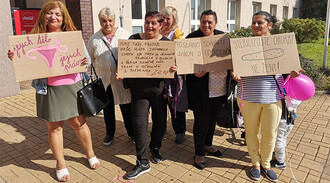 |
Bodily autonomy: Why compensation for forced sterilizations is so important
[ 31.5.2021, Gwendolyn Albert, a human rights activist who won the price FOR HUMANITY by Roma Holocaust Compensation Committee (VPORH) in 2020 for defending and advocating for compensation of forcibly sterilized women
]

The principle of bodily autonomy is the idea that each individual human being has the right to control what happens to their physical body, an idea that has been taken seriously by systems of law only relatively recently in human history. As I have noted elsewhere, this principle of individual autonomy is also a cornerstone of the concept of human rights. Respect for individual bodily integrity is a related idea - the notion that an individual's physical body should be considered a territory over which an individual has sovereignty. From this stems the notion of consent - confirmation that the person in charge of the body should agree to any intervention by others in that body.
These ideas are closely related to individualism more generally, which philosophically speaking is part of liberal politics – individuals bear rights, and the governance of individuals can only be considered legitimate if it is based on their consent, which in democracies is expressed through the principle of “one person, one vote”. In this sense, it is the opposite of the totalitarian politics that prevailed in the former Czechoslovakia, the aftermath of which we are still coming to terms with today.
Racializing human bodies
Racism was one of the most powerful, if not the most powerful, societal forces during the 20th century, one that we have yet to eliminate from our belief systems and our thinking. The conviction that the body and its physical traits, mostly associated with the color of complexion, eyes and hair, are predictors of human behavior, that different “races” exist, and that some are “superior” to others, is an idea that became socially unacceptable only recently in human history. Advances in science have revealed how genetically similar all human beings are to each other, and the pseudo-science of eugenics, as it existed at the start of the 20th century, is no longer the dominant mindset. Among non-scientists, however, these beliefs have yet to be overcome, and since the advent of social media in the 21st century, it has recently become impossible to ignore how many people there still are who wholeheartedly believe in their own alleged superiority by virtue of the traits they were born with, be they racial or sexual. These people also loudly resent the fact that, broadly speaking, elite opinion and the laws in their countries no longer support such a world view.
To racialize is to categorize people on the basis of the dubious concept of “race”. In both the former Czechoslovakia and the present-day Czech Republic, Romani people have been and still are subjected to being racialized, “othered”, and treated as inferior, but acknowledgment of this fact is proving very difficult to achieve. The legal code may acknowledge that crimes committed with racial motivation are deserving of stricter sentencing, for example, but in practice, even when reviewing violent crimes where there is evidence of racial motivation, the criminal courts still tend to ignore that aspect altogether when the victims are Romani. This has the effect of somehow absolving those who still perpetrate racialization and racism here, and indeed, it has been explicitly approved of by some of the recent remarks of the current Public Defender of Rights, who has repeatedly expressed his sympathy for the bigoted generalizations made about Romani people as inferior.
The pernicious effect of racialization in the former Czechoslovakia and present-day Czech Republic and Slovakia is perhaps best demonstrated by the forced sterilizations of women; as far as the evidence we have seems to show, most of those who have been forcibly sterilized have been of Romani origin. As of this writing, a bill to compensate the victims of these harms awaits a second reading in the lower house. If that bill becomes law, it will mark a milestone in the Czech state acknowledging the importance of honoring the concepts of bodily autonomy, bodily integrity, and free, informed choice and consent.
Compensation for forced sterilizations redresses violations of autonomy
According to leading ethicists who have guided law and policy when it comes to reproductive health services in the postwar era, health care providers’ ethical obligations include respecting bodily autonomy, doing no harm, and providing services equitably. Informed choice and consent are supposed to have become crucial, irreplaceable components of reproductive health care by now. That includes the informed choice of and consent to procedures such as sterilization by tubal ligation (or other means) for the purposes of contraception. Unfortunately, this principle has been violated countless times by gynecologists the world over, and the racialization or “othering” of the women who have been harmed in this way has played a clear role in motivating these violations.
Forced sterilizations – surgeries not chosen by the individuals on whose bodies they are performed and not freely consented to – have been used by modern states to control populations, especially the birth rates of those considered inferior. Early 20th-century policies to promote sterilization attempted to prevent the reproduction of disability, of ethnic groups considered inferior, of racialized groups, and also targeted the poor, the unmarried, and women seeking abortion. In Europe, these policies were implemented during the first half of the 20th century in Austria, Denmark, Finland, France, Germany, Sweden, Switzerland and Norway.
Communist Czechoslovakia began its forced sterilizations in the late 1960s. The details of these abuses and the experiences of the few individuals who have brought lawsuits in these matters have been covered by the 2005 Final Statement of the Public Defender of Rights, and a recent issue of the Romani džaniben journal has published in Czech, for the first time, a study from the late 1980s that was part of dissidents’ efforts to end these abuses. As ombudsman Motejl found, however, the ad hoc performance of sterilizations without women’s free, informed choice and consent, usually during caesarean deliveries, continued well into the 21st century. Most of those who are speaking up about those abuses are from the Romani community.
At long last, a bill to compensate all those who have been forcibly and therefore illegally sterilized now awaits a second reading in the lower house. Once it is adopted, there will still be challenges for the women seeking redress. The first challenge will be to make sure that the experts chosen to assess claims for eligibility for compensation will be familiar with the ethical and legal issues involved. The second challenge is that the bill only covers the period through 2012, when regulations governing the performance of sterilizations were updated to establish the requirement of a waiting period between the time such surgery is requested by a patient and the time it is performed by the surgeon, which is meant to create a clear record of freely given, informed consent to such operations. Those who have alleged they were sterilized without their free and informed choice and consent after 2012 will need to find legal representation right away if they seek redress for these violations, and they will need to do so before their eligibility for compensation expires, if that three-year limitation has not already.
The importance of lawmakers agreeing that these violations of bodily autonomy, bodily integrity, and human dignity should be compensated cannot be overstated. Human rights advocates, all who seek to uphold the law, and the health care community need to reach a consensus on how to treat all women with dignity and respect and how to provide them with the information they need, in a comprehensible fashion, to make sure no surgeon ever ends up performing such an irreversible, unwanted procedure on anybody here ever again.
There is not room here for me to detail the many ways in which these women have been duped and lied to by the health care and social work professions, nor is there room to describe the harm done to their minds and souls by those violations of trust. The credo to “first do no harm” must include respecting bodily autonomy and integrity, and hopefully one day such practices will be unimaginable.
Český překlad naleznete zde.
The photo comes from a demonstration in front of the Ostrava hospital in September 2020. These are women who were forcibly sterilized and asked for the first reading of a bill that would compensate them.
Photo by Kumar Vishwanathan.
|





